The Carbon Man
3 min readIn the waning century of soot and sorrow, when twilight hung over the cities like a funeral shroud stitched from the exhaust of empire, there arose from the belly of the Earth a figure—neither man nor myth, but something more elemental. He was called The Carbon Man.
Born not of mother but of metamorphic heat and geological grief, his cradle was the forgotten coal seam beneath the Appalachian spine. There, where ancient forests lay entombed beneath the sediment of lost epochs, pressure begot structure, heat forged permanence, and from the darkness of fossil memory he ascended.
His skin, a velvet black that shimmered like a raven’s wing beneath moonlight, bore the sheen of graphite. His bones, latticed in diamond, refracted stars when he moved through shadow. He spoke with the soft crackle of burning cedar and the gravity of tectonic rumble. He was the ghost of carbon past—and the harbinger of what must come.
He wandered, solitary and solemn, through towns where chimneys still coughed black phlegm into the sky. In each place, he was met with awe or revulsion. For he carried with him the scent of both salvation and ruin.
“I am not the villain,” he whispered in the court of kings. “I am the consequence.”
Wherever he went, engines faltered, and glass skyscrapers seemed to fog from within. Yet fields turned green in his shadow, and trees leaned gently as if bowing in recognition.
In time, stories flourished of his deeds. Some claimed he drew carbon from the lungs of the Earth and reshaped it into crystalline spires that sang when the wind passed through them. Others whispered he had kissed a dying child on the forehead and left a black diamond in her hand, pulsing faintly with life.
One such tale told of a midnight encounter on the edge of a ruined orchard. A child, barefoot and sleep-eyed, asked him, “Are you a monster?”
He knelt, voice flickering like a hearth ember. “If I am, it is only because the world made me so. But tell me—do you fear the fire, or what it leaves behind?”
The child thought for a moment, then simply said, “I think the fire just wants to be warm.”
He nodded once, his eyes dimming with something between sorrow and reverence.
But always he moved on, pursued not by armies but by ideas—opposition brewed in silicon-clad towers where the Clean Age priests called him a relic, a remnant of sin. Yet he laughed, low and mournful, and said, “Without me, your very breath is a heresy.”
At last, they summoned him to a tribunal—The Trial of Carbon—where digital saints and synthetic sages proclaimed his obsolescence. He stood barefoot on engineered stone, silent as accusations of entropy and excess rained upon him.
“What do you plead?” asked the lead arbiter.
He raised a single hand, palm stained with the smudge of centuries. “I plead history. I plead photosynthesis. I plead the first breath of your first ancestor.”
And the chamber fell still, unable to sentence a thing so intrinsic.
As coal plants fell and carbon credits replaced coin, The Carbon Man began to fade. Not from weakness, but from choice. He withdrew to the mountains, where time thickens and stories ferment into legend.
And still, in the hush between winds, one might hear a voice:
“Burn not what births you, for even fire remembers its forest.”
He waits—not for worship, nor for war—but for wisdom. When the world remembers that life and death share the same atom, he shall return.
For he is not our destroyer. He is our measure.
The Carbon Man.







